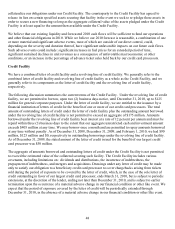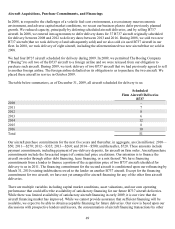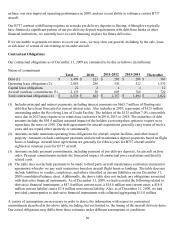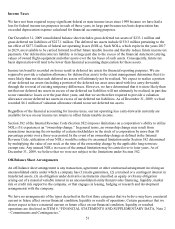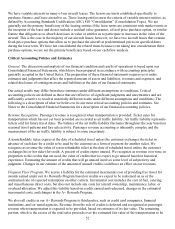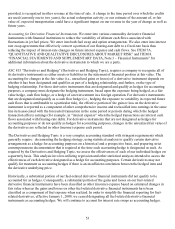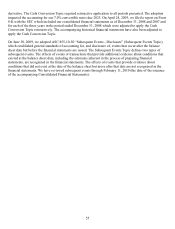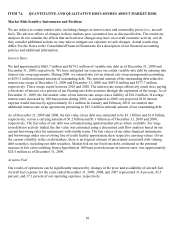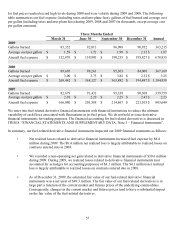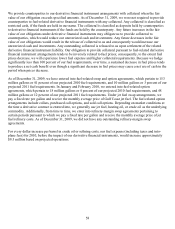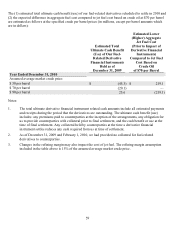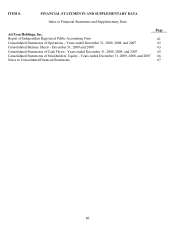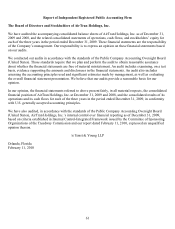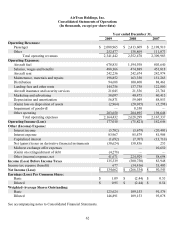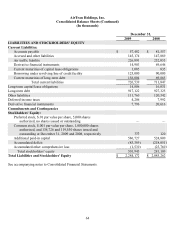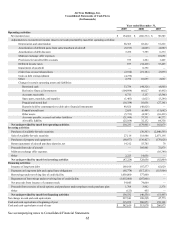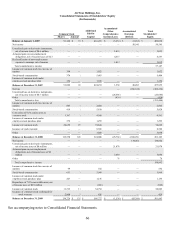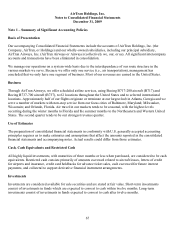Airtran 2009 Annual Report Download - page 67
Download and view the complete annual report
Please find page 67 of the 2009 Airtran annual report below. You can navigate through the pages in the report by either clicking on the pages listed below, or by using the keyword search tool below to find specific information within the annual report.58
We provide counterparties to our derivative financial instrument arrangements with collateral when the fair
value of our obligation exceeds specified amounts. As of December 31, 2009, we were not required to provide
counterparties to fuel-related derivative financial instruments with any collateral. Any collateral is classified as
restricted cash, if the funds are held in our name. The collateral is classified as deposits held by counterparties
to derivative financial instruments if the funds are held by the counterparty. Any future increases in the fair
value of our obligations under derivative financial instruments may obligate us to provide collateral to
counterparties, which would reduce our unrestricted cash and investments. Any future decreases in the fair
value of our obligations would result in the release of collateral to us and consequently would increase our
unrestricted cash and investments. Any outstanding collateral is released to us upon settlement of the related
derivative financial instrument liability. Our obligation to provide collateral pursuant to fuel-related derivative
financial instrument arrangements tends to be inversely related to fuel prices; consequently, to the extent fuel
prices decrease, we will experience lower fuel expense and higher collateral requirements. Because we hedge
significantly less than 100 percent of our fuel requirements, over time, a sustained decrease in fuel prices tends
to produce a net cash benefit even though a significant decrease in fuel prices may cause a net use of cash in the
period when prices decrease.
As of December 31, 2009, we have entered into fuel-related swap and option agreements, which pertain to 153
million gallons or 41 percent of our projected 2010 fuel requirements, and 10 million gallons or 3 percent of our
projected 2011 fuel requirements. In January and February 2010, we entered into fuel-related option
agreements, which pertain to 18 million gallons or 4 percent of our projected 2010 fuel requirements, and 48
million gallons or 12 percent of our projected 2011 fuel requirements. Under jet fuel swap arrangements, we
pay a fixed rate per gallon and receive the monthly average price of Gulf Coast jet fuel. The fuel-related option
arrangements include collars, purchased call options, and sold call options. Depending on market conditions at
the time a derivative contract is entered into, we generally use jet fuel, heating oil, or crude oil as the underlying
commodity. Additionally, from time to time, we enter into refinery-margin swap agreements pertaining to
certain periods pursuant to which we pay a fixed rate per gallon and receive the monthly average price of jet
fuel refinery costs. As of December 31, 2009, we did not have any outstanding refinery-margin swap
agreements.
For every dollar increase per barrel in crude oil or refining costs, our fuel expense (including taxes and into-
plane fees) for 2010, before the impact of our derivative financial instruments, would increase approximately
$9.5 million based on projected operations.


